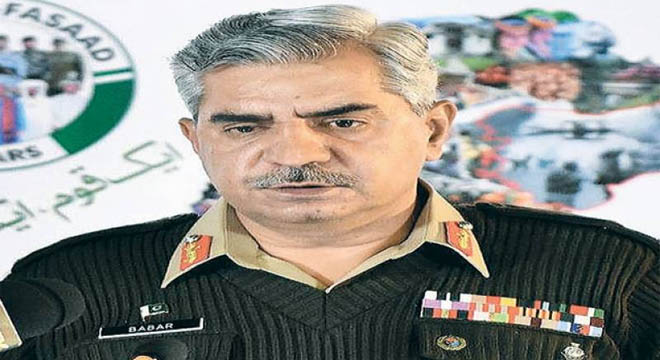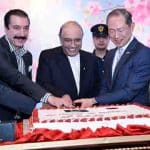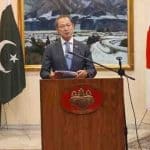RAWALPINDI – Director General of the Inter-Services Public Relations (ISPR) Directorate, Major General Babar Iftikhar said Monday that the nation’s journey from terrorism to tourism was a difficult one and required patience but Pakistan Armed Forces and other law enforcement agencies (LEAs) made it possible with the cooperation of countrymen.
Elaborating the dividends earned through Operation Raddul Fasaad on completion of its four years, the military spokesperson said that the economic activities are underway in those areas that were once terrorism-hit.
“Today, playgrounds in Pakistan are full of life while Gwadar, northern areas and K2 have become focus of the world,” he said adding that all this happened as a result of build and transfer phase of this operation which is still under way.
The DG ISPR addressing a news conference said that the basic center of the operation that started on February 22, 2017 under the leadership of Chief of Army Staff (COAS) General Qamar Javed Bajwa was the people of Pakistan.
“While armed forces fight terrorists; terrorism and extremism can only be defeated by the civil law enforcement agencies and society as a whole. That is all we look at it,” he said adding that every Pakistani was not only a part of this operation but as whole of nation approach, every Pakistani is Sepoy (soldier) of Raddul Fasaad.
The operation was not area-specific as its domain was extended to the whole of Pakistan and the “strategic intent of the operation was and is “peaceful, strong and normalised Pakistan” in which people’s confidence on state would restore and terrorists would be made ineffective completely by curtailing their freedom of action, he said.
The DG ISPR also dismissed some social media reports about the appointment of a new chief of the Inter-Services Intelligence (ISI) to replace Lt Gen Faiz Hameed as “baseless speculations” and said that there is no truth to them.
353 terrorists killed, hundreds arrested
“There is no truth to such things. These are baseless speculations,” he said while replying a question about reports circulating on social media that Lt Gen Hamid was going to be replaced, possibly by former DG ISPR chief Lt Gen Asif Ghafoor. He requested that speculations should be avoided on such issues.
He clarified that appointments in the Pakistan Army, especially on the senior level positions, were not “short-lived” and the tenure of the head of an institution usually lasts for two years.
Giving a background of Operation Raddul Fasaad, he said that the operation was started under a two-prong strategy at a time when terrorists and their facilitators after demolition of their infrastructure as a result of different operations were trying to take shelters in different parts, towns and cities, of the country. “One prong looked after domain of counter terrorism (CT) and other is about counter violent extremism (CVE).”
The baseline of CT was that the use of force was only privilege of the state and with this, he said that the objective was to bring compete stability in western zone with border management and to end the support base of terrorists.
About CVE, he said that “an ideology can only be countered by a superior duology and superior argument.” “In this contest, the objective was to overcome violent elements by helping the government in its efforts to implement the National Action Plan (NAP), to bring erstwhile Federally Administered Tribal Area (FATA) into the mainstream and to bring Madaras and police reforms.”
Major General Babar Iftikhar said that the grand strategy of Pakistan against war on terrorism was “clear, hold, build and transfer.” He said that the war was fought under these four phases. From 2010 to 2017, it was a clear and hold phase and most of the areas had been cleared of terrorists and the writ of the state was being restored in tribal areas, he reminded the journalists.
“Raddul Fasaad was the start of build and transfer phase and we had to made irreversible the hard-earned gains—a real parameter of success against terrorism.” The head of military’s media affairs said that social economic uplift and operationalization of civil institutions, after kinetic operations, was the real step towards attaining forever peace and the world was now recognizing this.
Giving the details of the operation, he said that over 375,000 intelligence-based operation (IBOs) were conducted during the last four years with full participation and help of CTD, IB, ISI, MI, police, FC and Rangers. Over 150,000 IBOs were conducted in Sindh, followed by over 92,000 in Khyber Pakhtunkhwa (KP), over 80,000 in Balochistan and 34000 in Punjab. He said that some of the major and important IBOs helped in elimination of urban terrorism and terror networks and paid tributes to the intelligence agencies for their untiring efforts in dismantling major terror networks.
The DG ISPR went on to say that more than 5,000 threats alerts were issued during four years and most of these were neutralised before their materialization. During Raddul Fasaad, Khyber -IV operation was conducted and another operation was launched in Northern Waziristan and writ of the state was restored over 750 sq. km area of the country.
De-weaponization and Demining:
The military spokesperson said that there was much improvement on de-weaponization and explosives control. Over 72,000 illegal arms and five million ammunitions were recovered throughout the country during this operation. From 2017 to 2021, he said that 1850 incidents of terrorism occurred in the country and 16,84 cross-border fire incidents occurred on Pak-Afghan border. “353 terrorists were killed and hundreds arrested during last four years.”
Maj Gen Iftikhar said that a massive effort of demining has been made in tribal districts of KP and more than 72 kilometer area has been cleared. “It is a painstaking and slow procedure and two solders embraced martyrdom and 119 got injured during demining…The process is moving forward with care and concentration,” he said adding that over 48,000 mines have been recovered under the operation.
He said that many security posts were established in different areas of tribal areas during and after the different operations and now over 42 percent these posts have been reduced bringing their number from 450 to 250 under the build and transfer phase. The existing posts are only for safety of the people which would be reduced further, he also said.
Capacity Building of LEAs/ Border Management:
The DG ISPR said that the capacity enhancement of LAEs was the major part of Raddul Fasaad and 58 new wings of FC have been established and the establishment of its more than 15 wings was under way.
During four years, security forces has got trained 37,428 police personnel countrywide and more than 4,000 more would be trained in next six months and would be made part of the police force of tribal areas. Besides this, Pakistan Army has got trained 3,865 Levies personnel in Balochistan and this year, more than 35,00 personnel of the force are being trained.
Under the border management, 84 percent work of border fencing on Pak-Afghan border and over 43 percent fencing on Pak-Iran border is complete. Besides this, 497 forts, borders posts and border terminals have been built. Only at border points in Chaman and Torkham, a state of the art integrated transit trade management system is being installed that will be functional in the next two few years, he said.
He said that a special border management division has been raised under the Ministry of Interior and it will remain the lead agency in border management. He said that 96 percent of temporary displaced persons (TDPs) had been repatriated to their homes under a cohesive strategy.
Implementation of NAP:
Giving details of implementation of NAP, Maj Gen Iftikhar said as many 717 cases were referred to military courts, 344 terrorists were given death sentence, 58 were executed, 106 were given life imprisonment, 195 were given different imprisonments and five were acquitted. He said that full action was taken against more than 78 terror organizations and major terrorists, assets of terrorists were frozen and their movement was restricted under NAP. The incidents of money laundering, extortion, abduction for ransom and target killing were over come through an effective strategy.
From 2017 to until now, over 1200 sub-national extremists surrendered and adopted way of peace, he said. The hate speech and hate material were banned and narrative of terrorists was got failed effectively. He reminded that over 1800 religious scholars unanimously gave a narrative against terrorism through “Paigham-e-Pakistan.” The document helped in overcoming sectarianism and extremism.
Under de-radicalization plan, more than 5,000 extremists have been re-integrated into the country.
Concluding his presser, the DG ISPR said that they had thwarted the designs of hostile intelligence agencies who promote extremism in people and especially in youth in Karachi, Balochistan and Gilgit-Baltistan and referred to Mehdi Shah Rizvi and his family’s public statement about this which he said was a clear example of that. In this context, conspiracies by hostile intelligence agencies were exposed and irrefutable evidence was brought before the world regarding training and assistance of terrorists.
Talking about the dividends, he said that 831 development projects of worth Rs 31 billion have been started in tribal districts of KP while major projects have been started under Vision Pakistan Programme in Balochistan besides CPEC projects. He said that the other dividends of the operation included making secure borders, madrasa reforms, merger of tribal areas into KP and transfer of powers to police and district administration there.
He underscored that operation did not face a halt despite the nation faced Covid-19 pandemic and food security challenge in the form locusts attacks last year and campaign against polio vaccination was also moved ahead. The security institutions played their role in all areas. The fencing, IBOs and clearance of leftover areas also remained underway during the period. “The dividends of operation are apparent in every domain,” he said.
The military spokesperson announced that Pakistan Day Parade would be held on March 23 with full national enthusiasm and Armed Forces would fully participate in it. “The journey of this peace is under way successfully,” he said and added: “We have come a long way and I must say that there is still a lot of ground to be covered, and we can cover it through unity.” He said that they would overcome every challenge with the cooperation of people. As third decade of 21st century has started, and this time the message of Youm-e-Pakistan (Pakistan Day) is “one nation, one destination,” he said.
Replying questions, the DG ISPR said Pakistan was adapting to the changing environment and the new challenges that come in the domain of hybrid war and fifth-generation warfare. He said that the country was prepared to face the new security threats in cyberspace. He said that work is being done to stop the activities of hate speech by certain organizations on social media and the government would introduce legislation in this regard. A very much negativity on social media id doing rounds, he also said. About India’s anti-Pakistan campaign on social media, he said that it has to be seen what traction in gets on this platform which itself is facing credibility issues. “If it het some traction on any issue, we respond very much.”
Maj Gen Iftikhar said the international community had responded very positively to the dossier prepared by Islamabad of Indian sponsorship of terrorism in Pakistan and that “it has been taken seriously at every forum.”
He noted that many international organizations had lately issued statements and documents that proved that the dossier was being taken seriously.
Asked about the Financial Action Task Force (FATF) plenary which would decide about keeping or removing Pakistan from its grey list, the DG ISPR said the watchdog worked according to a procedure. He said Pakistan had done a lot of work to meet the FATF recommendations and its progress was acknowledged at every forum. “There is lobbying as well; every time we go a lobby starts working against us and we have to over this,” he added.
On the Afghan peace talks, he said the process was moving forward in a positive direction.
“So far I think everyone is listening to everyone and it’s progressing in a positive direction, he emphasized.
He said Pakistan had “no favourites” in the peace process and they only wanted peace in Afghanistan because peace in Pakistan is absolutely connected to peace in Afghanistan. Replying a question, he hoped that some one day y international (ODI) or Pakistan Super League cricket match should be held on Gwadar cricket ground. And if not this year, then it might be held next year, he added. He said that the phase of build and transfer has not been ended rather they were in the middle of it. “We need to stay to the course.”
Follow the PNI Facebook page for the latest news and updates.









